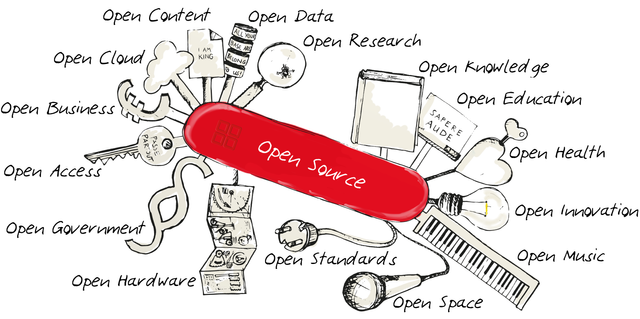Finding The Best Governance Model
In real world companies we usually only see two types of organizations, but it slowly seems that a third is entering, the efficiency of which is completely unknown. Economics teaches us that the two main types of companies are either privately run like most of the companies you know of in America, or government run like many of the Chinese companies providing essential materials to China’s growing infrastructure. Of course there are many examples of companies with hybrid solutions, but they are much rarer throughout the world. However, with the rise of the internet, came the rise of a third solution of governance for organizations and companies, the open sourced model. Linux being the most well known example, but I want to mostly focus on crypto governance as it relates to bitcoin. How efficient is the Open Source model compared to the other two and what benefits does it bring?

The first model is probably the most well known to the western world, the Privately Run governance model, as almost every company we interact with falls into this category. The benefits of this model come from it being the most efficient at production and making money as the best people are usually the ones who end up running the company while those who don’t pull their weight end up losing their jobs. The ability to keep the companies lean and profitable in a moment’s notice, let them stay competitive and continue running for long periods of time. This model is hailed as the best economic governance model to economists because of its ability to stay efficient. The drawbacks mostly come when you have someone at the top who continuously makes bad decisions not in line with anyone else. The idea of the benevolent dictator comes to play here as one man usually can make the decision he feels is right. If that person fails to make the right decisions, the company will fail as well, which is the main, albeit expected, problem with this model.
Next we have the Government Run model , which is the model of choice for many stricter or newly industrializing nations without complete capitalistic ideals. We see this model in places like China and India in industries seen as essential for their long term growth. If we look at the Chinese steel industry in particular, we can see the perfect example of the Government Run Model. While not the most efficient, the government run model does allow the government to keep certain industries afloat. Usually it does this by regulation or bailouts, but many argue saving these inefficient companies is not how capitalism works, which I agree with. However the government usually sees these companies as essential to growth and does not want to allow them to fail and wait a period of time for an efficient competitor to arise. Economists agree that what most governments need to do is hand over the reins completely to the corporations so the best and most efficient workforce can run the company. However most countries that consider running government owned enterprises don’t particularly agree they should give up power to them. The negatives come with less efficiency and productivity but the positives come with an inability to fail as most of the time the government will bail out the companies.

Finally we have the new model which really came about seriously with the creation of the internet, which is the open source model. There haven’t been a bunch of studies done on this model so I will mostly be giving my opinion as to what I think about it. While I like the open source model, I think it has many flaws which cause it to be far less efficient, but also at the same time more sustainable. The lack of efficiency in my opinion comes from the lack of someone making the final decisions. If we look at the segwit debate or the other soft / hard fork proposals before this, bitcoin has taken a long time to address the problems that many believe need to be solved as soon as possible. The lack of a sing entity controlling what happens, slows down development time for what the system actually needs. At the same time open sourced projects far better represent the community as a whole as they can have their voices directly heard.
The positives also come with open source projects never really dying because anyone at anytime can continue to develop and control the reins. The low cost of running an open sourced project with developers working out of mostly interest in the beginning means that the barrier to entry is much smaller. Even after projects fizzle out, a single member can still maintain them in the long run.

Over the long run im sure we will see more open source projects and be able to provide a much better analysis of how efficient they really are, but for now I think it is mostly speculative. I am interested to see how the Segwit debate ends up turning out as, for the moment , it seems we are at a standoff between developers and miners. A benevolent dictator would be able to just force the changes through, but the lack of one, hurts efficiency. Curious to hear your thoughts on the idea.
-Calaber24p
hint: it's a voluntary one!
hint: impossible things aren't better
Shared on twitter
Disclaimer: I am just a bot trying to be helpful.
Open Source and GNU have been around for 20 years. Without open source, many softwares, databases, Internet based coding languages, and even industry standards in software development would have been years off. Instead, open source development projects led to more open source projects which educated an entire generation of developers and database administrators. Most of all, it forced competition for software companies to put out their best product because open source products have shown to be just as good or better.
I think this is the biggest strength for open source. You have many people who can work in the traditional corporate governance model but also participate it open source and create a product that forces to competition to innovate.
Resteemed!
Governance structure will get really interesting when traditional legal systems catch up and start protecting new crypto rights.
It will be interesting to follow the development of regulations brought on by the traditional legal systems and, more specifically, how they plan to actually enforce them on decentralized networks. The plausible deniability and lack of ability to prove onus that accompanies decentralization makes enforcement quite difficult and almost provides a sort of autonomy.
Agreed, extending legal systems into the crypto realm will be interesting and certainly requires a lot of thinking and trial-and-error. Likely, some crypto organizations will find it advantageous to jurisdiction shop and buy down risk perceptions by attaching to some legal system.
You left out the influence of shareholders valuing high share price over sustainability. Not only can this tank a company, it can tank an economy.
So can we view something like Steem / Steemit as an open-source project, housing individual/community projects that are networked on the high-speed, low-friction Steem blockchain? Not sure how different it is on something like the btc network. I guess the benevolent dictator in this case would be the attention economy put forth by all the distributed judging that's going on in this community.. lol.